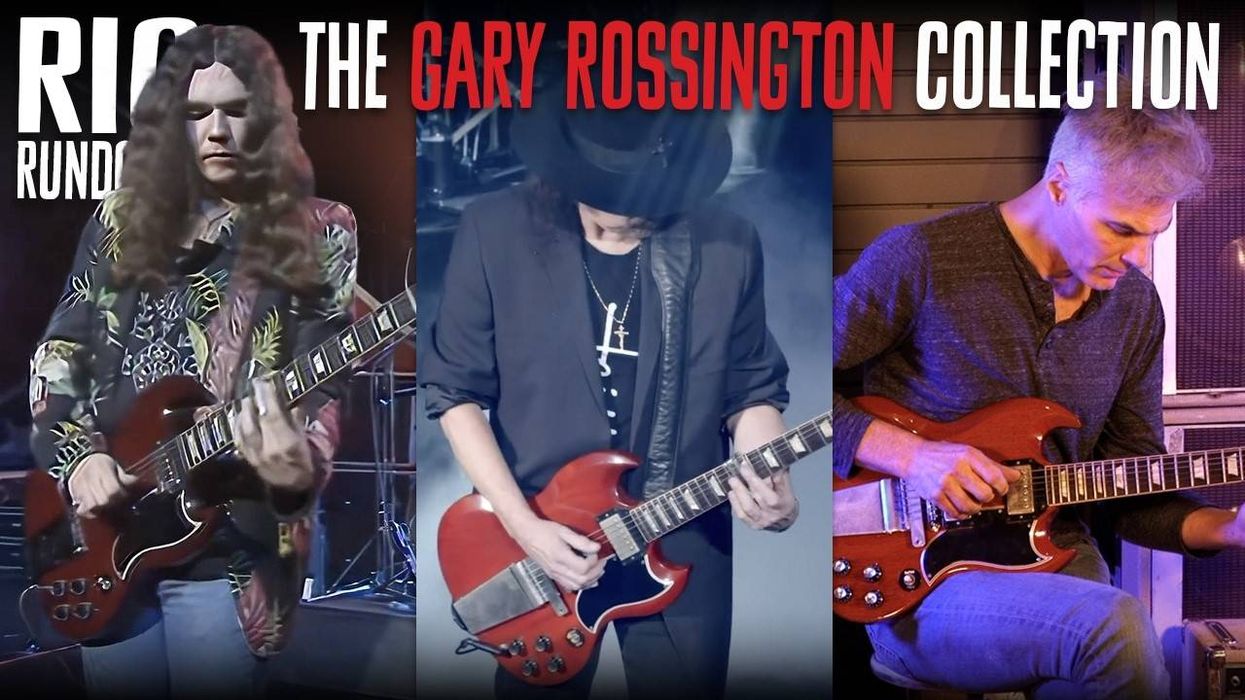We've all heard the colorful old saw that being in a band is a lot like being in a gang: a path fraught with so many tests of character, loyalty, and us-against-the-world commitment that it's become part of the lore behind everyone from Motörhead to Morbid Angel. Sure, the entire premise might sound a bit sentimental, especially against the doomy backdrop of, say, modern death metal. But when push comes to shove, so to speak, genuine camaraderie and mutual respect have somehow always oscillated at the molten heart of what fuels the ever-thriving metal scene.
Wes Hauch knows the terrain intimately. Now 38, he's enjoyed high-profile stints over the past decade with the Faceless, Thy Art Is Murder, Glass Casket, and Black Crown Initiate, and he's forged lifelong friendships along the way. After just a few minutes in conversation with him, it's easy to see why.
"Dude, that's what I've always wanted, you know?" he says in earnest. "I still am one of those guys who's a total romantic about bands. It's almost a high school thing, where you're like, 'We're gonna be the best bros, and it's gonna be totally democratic!' And you know, then you get your ass handed to you a few times, because it just doesn't often work that way. But it hasn't kept me from trying."
ALLUVIAL - 40 STORIES (OFFICIAL MUSIC VIDEO)
Check out the crushing lead single off the band's sophomore album, Sarcoma.
All that effort has paid off with Alluvial—the band Hauch hatched in 2015, at first as just an idea: "I started to think about putting a band together that was everything that I missed about what wasn't going on in heavy music," he says. It led to the moody and marauding all-instrumental debut The Deep Longing for Annihilation, self-released in early 2017 to little fanfare, but which nevertheless drew the attention of Animals as Leaders' Javier Reyes, who invited Hauch out for a U.S. summer tour. Alluvial very nearly dissolved in a haze of uncertainty by the end of that year, but for Hauch, the seed had been planted. Resolving to escape from Los Angeles and its swirling vortex of distraction and debauchery, he packed up his truck and made the cross-country move to Atlanta.
"There's something about the energy of Atlanta that just has always felt very welcoming to me," he says. "It's almost like you can feel its arms around you. L.A. used to feel like that, but not anymore." Word got out quickly that Hauch was ready to work on new material. Before long, he had ex-Suffocation lead singer Kevin Muller lined up to collaborate, and over the course of the following year they churned out a dozen demos that laid the foundation for Alluvial's latest album, Sarcoma.
Recorded with Muller and drummer Matt Guglielmo (Hauch plays all guitars and bass), and engineered at Vorticist Studios with John Douglass, who is well-known in metal circles for his tireless attention to sonic detail, Sarcoma plumbs wide and deep in its musical scope. Rooted lyrically in themes of pain, vulnerability, and catharsis, the album marks a notable transition for Hauch, not just as a guitarist, but also as a songwriter and producer.
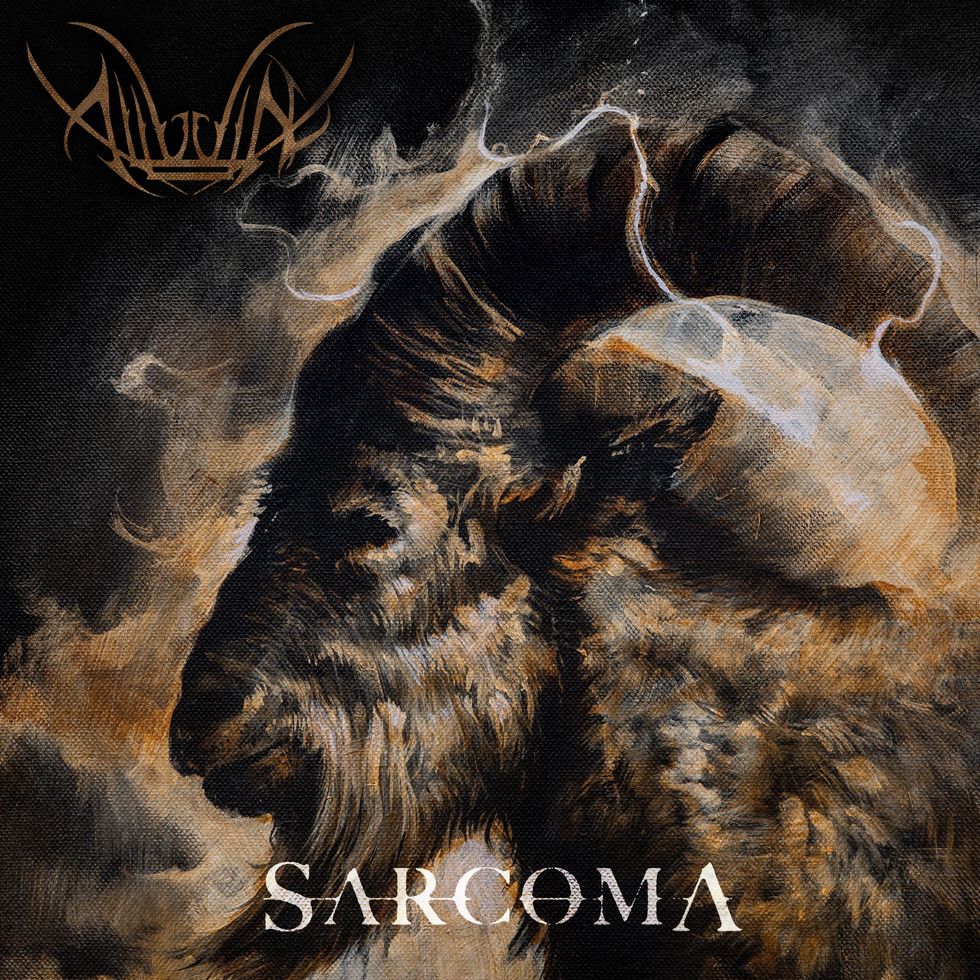
TIDBIT: Wes Hauch tracked Alluvial's Sarcoma with John Douglass at Atlanta's Vorticist Studios. "As far as the guitars go, there's nothing reamped," Hauch says. "The tone you hear is the tone that we tracked."
"For one thing, after the first album I'd grown pretty tired of my playing," he reveals. "I just wanted to reload the barrels, intellectually and otherwise. That being said, maybe one of the most challenging things in this day and age is that you need to be self-contained. You have to be able to record yourself pretty well, and you have to be able to make videos. So I spent time on trying to get good at that, and I spent time on my health and my psyche, just doing this deep cleanse on my own poor behaviors."
Meanwhile, Hauch set about upgrading his arsenal on a few key fronts. A two-year collaboration with the design team at Seymour Duncan led to the 2019 release of his signature Jupiter humbucker for 7-string guitar—a hypermodern beast that gives him high-end clarity with a huge bottom end. He added this to his Ibanez RGD guitars, even as the Ibanez L.A. custom shop was preparing several Iceman 7-string axes, including one with a beautifully finished, almost-mantis-green burst that arrived just in time to be featured on the bone-crushing album opener, "Ulysses."
"I still am one of those guys who's a total romantic about bands."
Hauch also updated his Mesa/Boogie stable of amplifiers, including a modded Triple Crown (retubed with JJ Electronic 6L6s and ECC83 high-gain preamp tubes) that he describes as "a completely different amp," with a bigger, ballsier sound, as well as a Revision F Dual Rectifier. "Boogie heads are like finding a wild horse or a bear and trying to make it bend to your will," Hauch jokes, citing his acquisition of a Boss Waza Tube Amp Expander, a Fortin Blade Whitechapel boost pedal, and a Fortin 33 Fredrik Thordendal Signature, all of which allow him to sculpt the traditional Boogie sound with unusual precision. "You have to hit them kind of hard with the clean boost. With the Fortin 33, I believe there's about 20 dB of a clean boost, with an emphasis on the 2.5k region, that puts the Boogie right in check and it makes it sound giant, but it's still got all this teeth on it."
To translate all that in the studio, Hauch found a kindred spirit in Douglass. Nearly all the sessions for Sarcoma were tracked by February 2020, before the pandemic shutdown, so the creative flow was never interrupted. "As far as the guitars go, there's nothing reamped," Hauch says. "The tone you hear is the tone that we tracked."
Wes Hauch's Gear
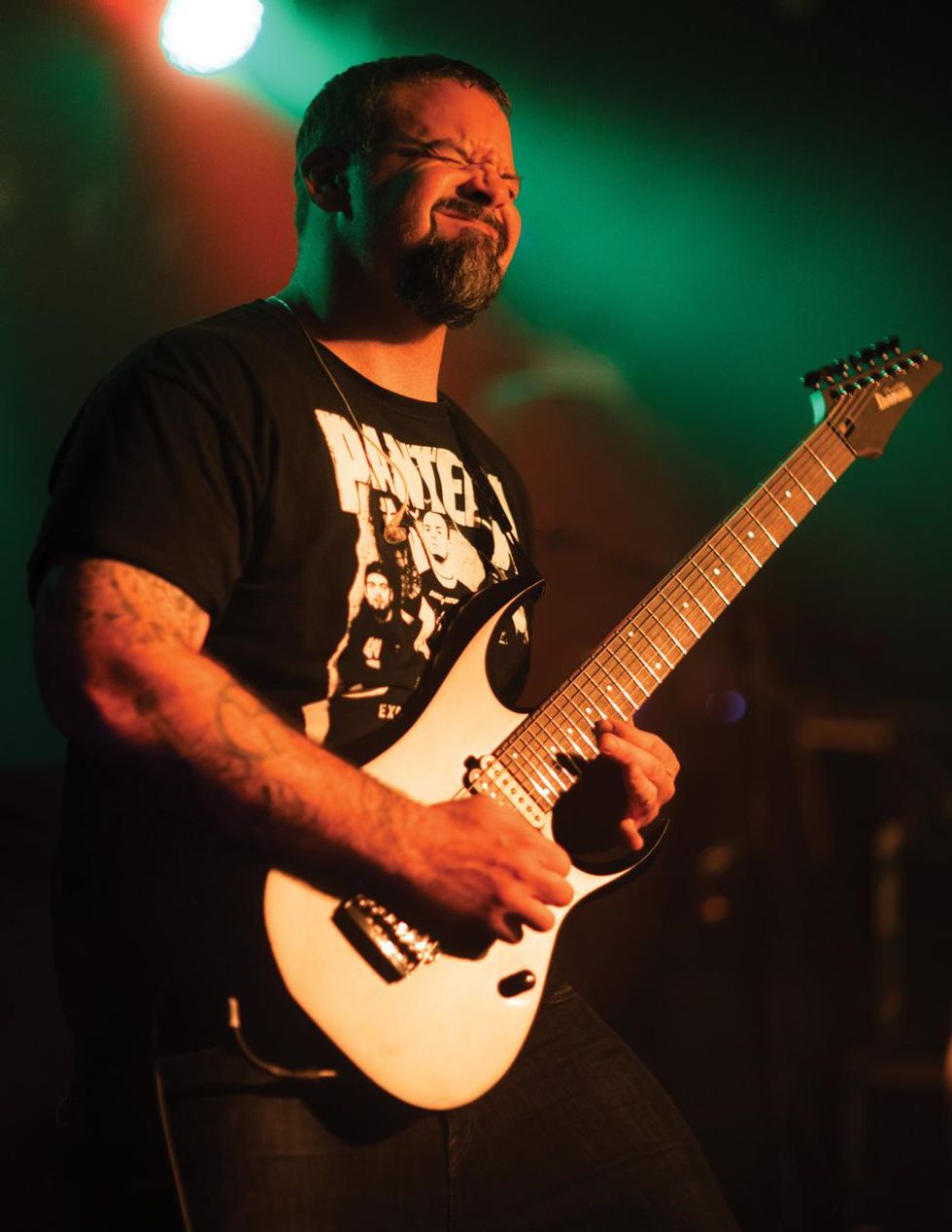
Photo by Randy Edwards
Guitars & Pickups
- Ibanez RGD (7-string)
- Ibanez L.A. Custom Shop Iceman (7-string)
- Ibanez BTB 5-string bass
- PRS Mark Tremonti Signature
- Seymour Duncan Signature Jupiter Rails
Strings and Picks
- D'Addario (.010–.052 gauge, .062 for 3rd string)
- Dunlop picks
Amps
- Mesa/Boogie Triple Crown TC-100
- Mesa/Boogie Revision F Dual Rectifier
- Boss Waza Tube Amp Expander
Effects
- Fortin Blade Whitechapel
- Fortin 33 Fredrik Thordendal Signature
- Line 6 Helix
Here, he points out the inspirational power that emerges when playing in G# standard tuning (G#–C#–F#–B–E–G#–C#) on seven strings—an inherent thickness that anchors each song in an earthy aura of conviction. "Along with certain vocal effects, a lot of the sonic identity was born at John's studio. John is really the hero of this record. We didn't work on the actual arranging of songs all that much, but he was there when I was writing lyrics. He's just someone that I trust."
Hauch invested just as much trust in his own ability, which comes through in the album's freewheeling sense of exploration. The title track explodes out of the gate as a menacing wave of staccato riffs underpinned with precision rhythm changes and thrashy textures, while Muller breathes fire into a line like, "Confess that you are no one—NOTHING," just as Hauch launches into an ecstatic solo that ripples, by contrast, with an uplifting sense of hope.
"Boogie heads are like finding a wild horse or a bear and trying to make it bend to your will."
"Sugar Paper," a trippy instrumental that surges with vintage-prog leanings, opens with Hauch laying out on a clean PRS Custom 22 (from Douglass' personal stash) before he gnashes into a complex, sawtoothed call-and-response section with Guglielmo. It's capped with a brilliant solo by the Black Dahlia Murder's Brandon Ellis, who brings his Eric Johnson and Yngwie influences straight to the forefront.
Hauch refers to "The Putrid Sunrise" as a twisted cross between Goatwhore and Black Flag, and it's all that: a seething, swirling mini-epic of hyped-up hardcore with a bridge section that swoops deep into psychedelia. The song came together as a subtle tribute to Hauch's mates down under. "I played it for Andy Marsh from Thy Art Is Murder. He's a good friend of mine, and he generally doesn't like my music, but I'm not one of those people who needs that in a friendship. I'd prefer you to be honest with me. And you know what a bogan is, right? That's Australian slang for a hick or a hillbilly. He said, 'Aw, this sounds like shit. It sounds like bogan thrash!' And it made me laugh. I'd disagree with him, but I like that he just tells me exactly what he feels."
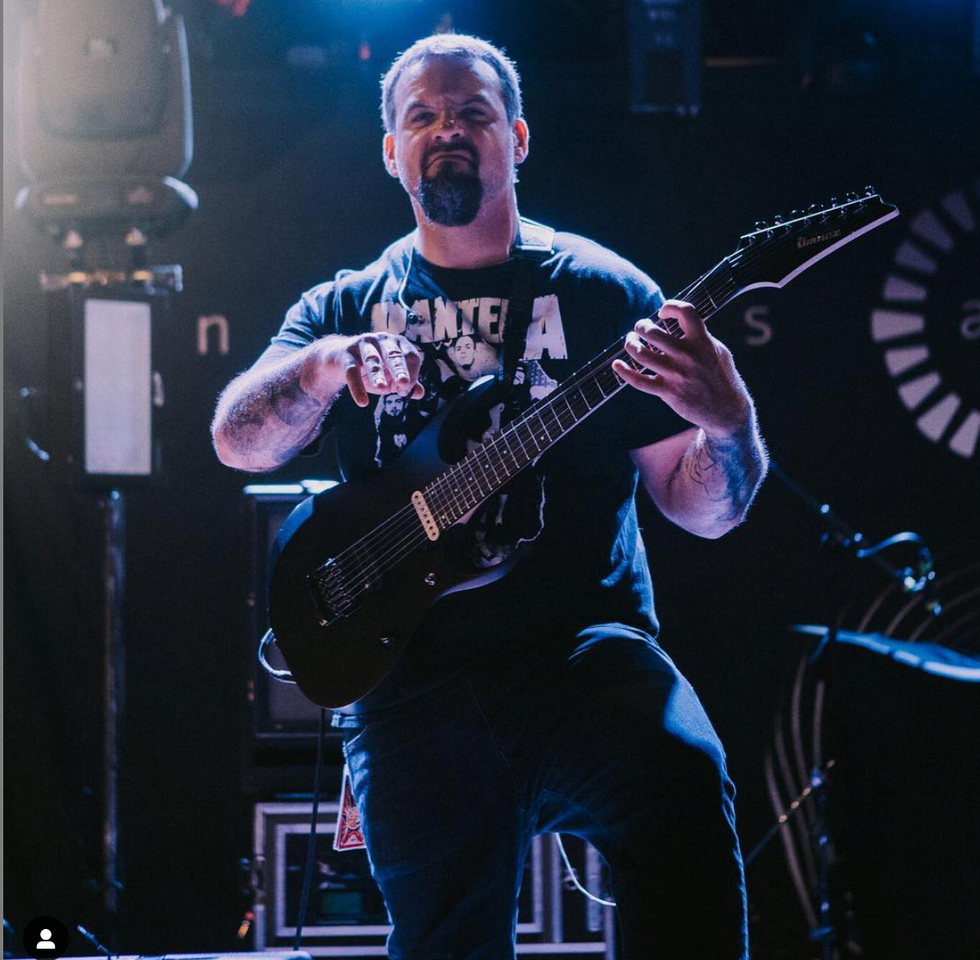
Hauch collaborated with Seymour Duncan on his signature Jupiter Rails humbucker for 7-string guitar, which he puts into his Ibanez 7-strings, such as this RGD model.
Photo by Randy Edwards
Just to flip the script, "40 Stories" features Hauch himself on lead vocals, delivering a soulful take on one of the album's most melodically adventurous tracks. "I just went in there and did it," he recalls. "I can sing, but I've never thought of myself as a singer. Basically, this whole band has been an exercise in figuring out what it is that I can actually do. And then I do it, and I'm like, okay, well maybe I should just do this all the time now."
Of all the themes and ideas Hauch brought to the woodshed in making Sarcoma, personal growth is probably the one that drives him most. To him, Alluvial is more than just a vehicle for creative expression, although that is an integral part of the plan. "I'm always trying to find something that's a different sort of rhythmic motif for metal, just to see if it's going to work, and if it's going to make people feel it, or if it's going to make me feel it, at the very least."
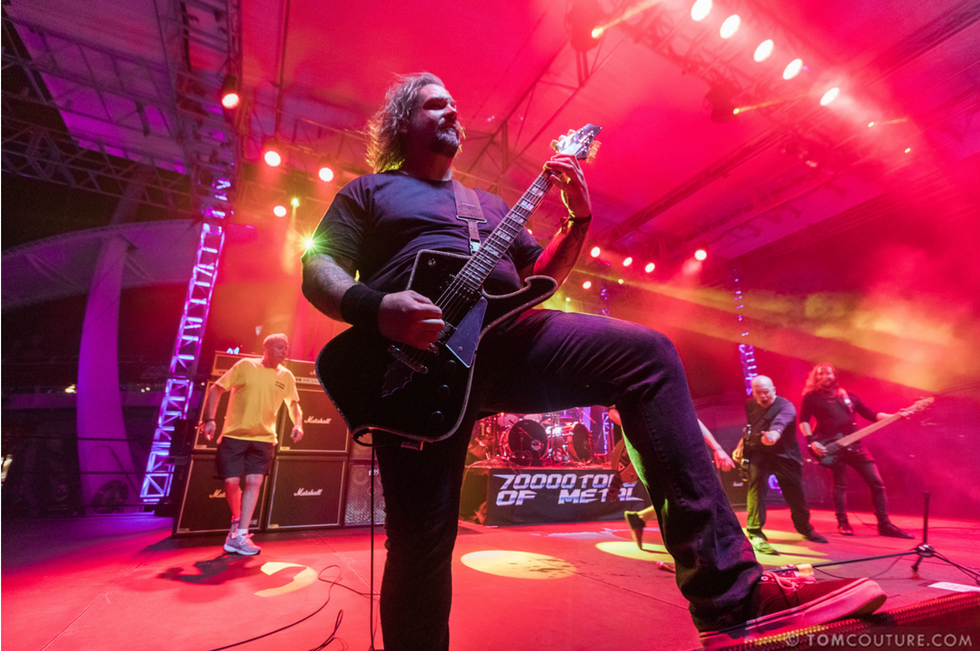
Wes Hauch plays his Ibanez Iceman 7-string while supporting Devin Townsend on the 7000 Tons of Metal 2020 cruise in January 2020.
Photo by Tom Couture
He talks with candor about finding these kinds of emotional connections, because, at the root of it all, he feels drawn to understanding and articulating the ideal, the responsibility, of what it means to be in a band. And with Sarcoma now in the books and potential live dates looming in the future, that ideal is morphing yet again, with bassist Tim Walker (Entheos) and drummer Matt Paulazzo (the Zenith Passage) joining the ranks for what Hauch hopes will be the long-term, fully activated version of Alluvial. However it works out, he wants everyone to know that he'll keep giving his heart and soul to the music.
"I'm always trying to find something that's a different sort of rhythmic motif for metal, just to see if it's going to work, and if it's going to make people feel it, or if it's going to make me feel it."
"For me, it really is from a very personal standpoint," he says thoughtfully. "But the personal part of it is, with heavy metal—especially the variety that we play—I want it to be for people who didn't get good grades in school [laughs]. But I also want our music to be inclusive, to a degree. As much as I love super deep cred shit, and that's always going to be a part of the music for this band, I still want to go play with Morbid Angel, or I want to go play with, like, August Burns Red, you know? I want to go play with everyone … all the people that enjoy the message that's usually coupled with that distorted guitar. And for anyone who's checking this out, I want to say thank you, because it's hard to get anyone to participate in your art these days. The fact that people are, I'm very grateful."
Wes Hauch - Alluvial "Ulysses" One Take Play Through
In this clip, guitarist Wes Hauch does a one-take playthrough of the opening track, "Ulysses," from Alluvial's second album, Sarcoma. As Hauch says, "No effects. No funny business. Warts and all."


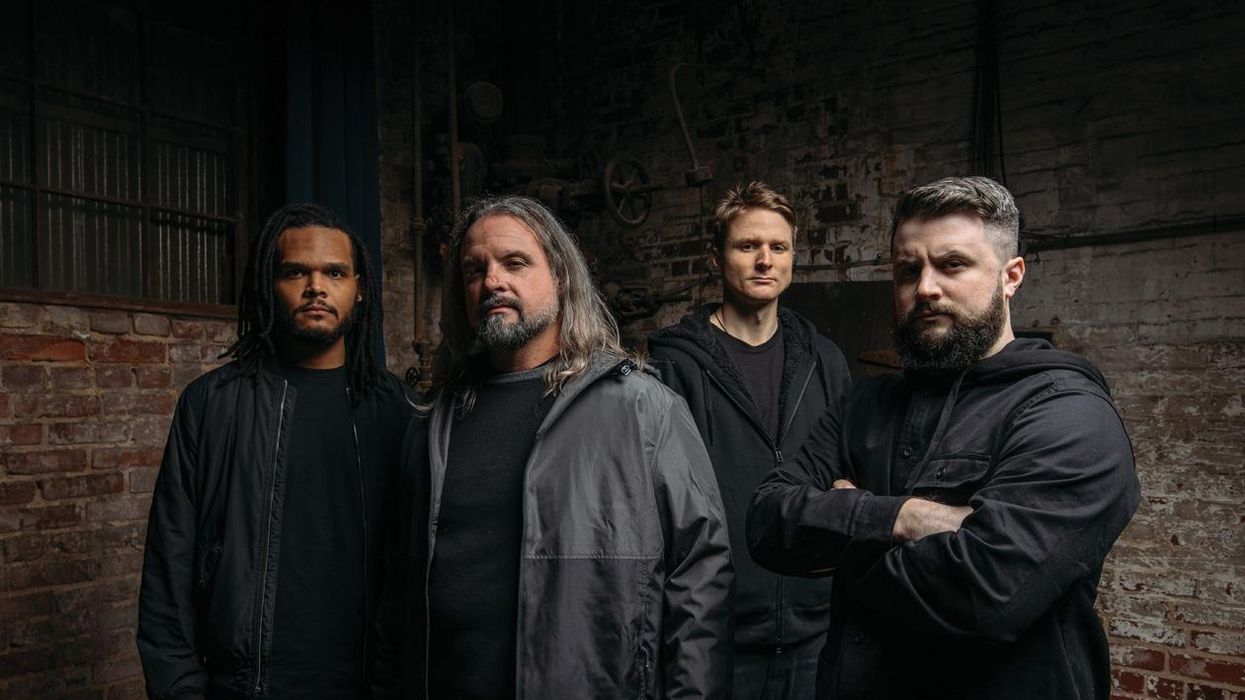







![Rig Rundown: Russian Circles’ Mike Sullivan [2025]](https://www.premierguitar.com/media-library/youtube.jpg?id=62303631&width=1245&height=700&quality=70&coordinates=0%2C0%2C0%2C0)

